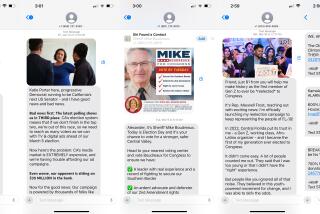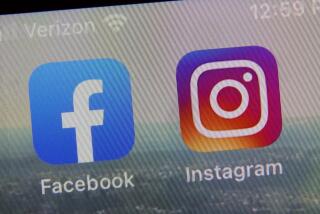Smartphone app reveals the politics in your shopping cart
Reporting from WASHINGTON — Herbal tea, Clorox wipes and Skippy peanut butter have a little blue in them, while Folgers coffee and Campbell’s soup are as red as their labels.
Finding out where your favorite brands lie on the political spectrum is now as easy as scanning bar codes with your iPhone.
BuyPartisan, a free smartphone application developed by former Capitol Hill staffer Matthew Colbert, gives users the chance to learn more about the political leanings of the makers of supermarket items.
By compiling campaign finance data from the top Fortune 500 companies and matching it with their products, the app lets consumers scan their groceries and immediately find out which political party stands to profit most from the sale.
“We’re trying to make every day election day for people,” Colbert said, adding that the app helps consumers support products that reflect their political beliefs.
BuyPartisan doesn’t directly urge users to boycott products, but that’s likely how many consumers will use it.
“For the first time ever, you’re able to take that product and bring it to a whole new light,” Colbert said. “A quarter or tenth of a penny that went to a political contribution might not be something you know.”
BuyPartisan is the first project of Colbert’s company, Spend Consciously. The app uses data compiled over the last decade by the Center for Responsive Politics, the Sunlight Foundation and the National Institute on Money in State Politics and pairs it with companies that produce 75% of supermarket goods.
The process is simple: Users scan a bar code using their phone’s camera, and within seconds data are displayed on the screen. A red and blue bar breaks down the percentage of Republican and Democratic support the manufacturer and its employees provided, while a green bar signifies “other.”
Dawn dish soap, for example, which is produced by Procter & Gamble, scores an average of 70.25% Republican, according to BuyPartisan. Celestial Seasonings tea, on the other hand, is 91% Democratic.
Still in the testing phase, the app has some glitches that occasionally misread the bar code or match to the wrong company. An Android version is in the works.
The company averages are computed from the donation histories of the chief executive, board of directors, affiliated political action committees and employees, and app users can dive deeper into the data breakdown of each category.
Procter & Gamble’s chief executive, according to BuyPartisan, gave the bulk of his money to the Republican Party, while the board of directors tended to spread their contributions more evenly.
“In light of Chick-fil-A and Hobby Lobby … people have become much more attuned to a company’s deeper impact,” Colbert said, referring to those companies’ corporate support for conservative causes.
The app aims to show users what’s behind a company’s public brand, said John Wonderlich, Sunlight Foundation’s policy director. Too often, consumers don’t realize bigger conglomerates manufacture the products they’re buying, he said.
A brand might promote one thing — progressive or conservative policies — and support the opposite with its dollars. Many companies donate to both political parties, and the issue is not whom they’re donating to, but how much is spent, Wonderlich said.
Knowledge about such practices promotes “a more accountable system,” Wonderlich said. “They’re clearly buying access so they can get policies favorable to them.”
Critics warn the app will only heighten American hyperpartisanship, allowing consumers to expand party politics to their shopping baskets.
In June, the Pew Research Center for the People and the Press published a report showing that Americans are more ideologically divided than they have been in the past.
“In each party, the share with a highly negative view of the opposing party has more than doubled since 1994,” the report said. “Most of these intense partisans believe the opposing party’s policies ‘are so misguided that they threaten the nation’s well-being.’”
Jack Marshall, lawyer and president of ProEthics, said society works best when it’s diverse and pluralistic.
“You don’t want every day to be an election,” Marshall said. “That’s why we have elections periodically, so people can calm down and work together.”
More to Read
Sign up for Essential California
The most important California stories and recommendations in your inbox every morning.
You may occasionally receive promotional content from the Los Angeles Times.










